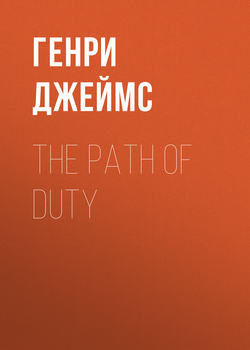The Path Of Duty

Реклама. ООО «ЛитРес», ИНН: 7719571260.
Оглавление
Генри Джеймс. The Path Of Duty
I
II
III
IV
V
VI
VII
VIII
Отрывок из книги
His brilliant prospects dated from the death of his brother, who had no children, had indeed steadily refused to marry. When I say brilliant prospects, I mean the vision of the baronetcy, one of the oldest in England, of a charming seventeenth-century house, with its park, in Dorsetshire, and a property worth some twenty thousand a year. Such a collection of items is still dazzling to me, even after what you would call, I suppose, a familiarity with British grandeur. My husband is n’t a baronet (or we probably should n’t be in London in December), and he is far, alas, from having twenty thousand a year. The full enjoyment of these luxuries, on Ambrose Tester’s part, was dependent naturally, on the death of his father, who was still very much to the fore at the time I first knew the young man. The proof of it is the way he kept nagging at his sons, as the younger used to say, on the question of taking a wife. The nagging had been of no avail, as I have mentioned, with regard to Francis, the elder, whose affections were centred (his brother himself told me) on the winecup and the faro-table. He was not an exemplary or edifying character, and as the heir to an honorable name and a fine estate was very unsatisfactory indeed. It had been possible in those days to put him into the army, but it was not possible to keep him there; and he was still a very young man when it became plain that any parental dream of a “career” for Frank Tester was exceedingly vain. Old Sir Edmund had thought matrimony would perhaps correct him, but a sterner process than this was needed, and it came to him one day at Monaco—he was most of the time abroad—after an illness so short that none of the family arrived in time. He was reformed altogether, he was utterly abolished.
The second son, stepping into his shoes, was such an improvement that it was impossible there should be much simulation of mourning. You have seen him, you know what he is; there is very little mystery about him. As I am not going to show this composition to you, there is no harm in my writing here that he is—or at any rate he was—a remarkably attractive man. I don’t say this because he made love to me, but precisely because he did n’t. He was always in love with some one else,—generally with Lady Vandeleur. You may say that in England that usually does n’t prevent; but Mr. Tester, though he had almost no intermissions, did n’t, as a general thing, have duplicates. He was not provided with a second loved object, “under-studying,” as they say, the part. It was his practice to keep me accurately informed of the state of his affections,—a matter about which he was never in the least vague. When he was in love he knew it and rejoiced in it, and when by a miracle he was not he greatly regretted it. He expatiated to me on the charms of other persons, and this interested me much more than if he had attempted to direct the conversation to my own, as regards which I had no illusions. He has told me some singular things, and I think I may say that for a considerable period my most valued knowledge of English society was extracted from this genial youth. I suppose he usually found me a woman of good counsel, for certain it is that he has appealed to me for the light of wisdom in very extraordinary predicaments. In his earlier years he was perpetually in hot water; he tumbled into scrapes as children tumble into puddles. He invited them, he invented them; and when he came to tell you how his trouble had come about (and he always told the whole truth), it was difficult to believe that a man should have been so idiotic.
.....
He was supposed to have embraced the diplomatic career; had been secretary of legation at some German capital; but after his brother’s death he came home and looked out for a seat in Parliament. He found it with no great trouble and has kept it ever since. No one would have the heart to turn him out, he is so good-looking. It’s a great thing to be represented by one of the handsomest men in England, it creates such a favorable association of ideas. Any one would be amazed to discover that the borough he sits for, and the name of which I am always forgetting, is not a very pretty place. I have never seen it, and have no idea that it is n’t, and I am sure he will survive every revolution. The people must feel that if they should n’t keep him some monster would be returned. You remember his appearance,—how tall, and fair, and strong he is, and always laughing, yet without looking silly. He is exactly the young man girls in America figure to themselves—in the place of the hero—when they read English novels, and wish to imagine something very aristocratic and Saxon. A “bright Bostonian” who met him once at my house, exclaimed as soon as he had gone out of the room, “At last, at last, I behold it, the mustache of Roland Tremayne!”
“Of Roland Tremayne!”
.....